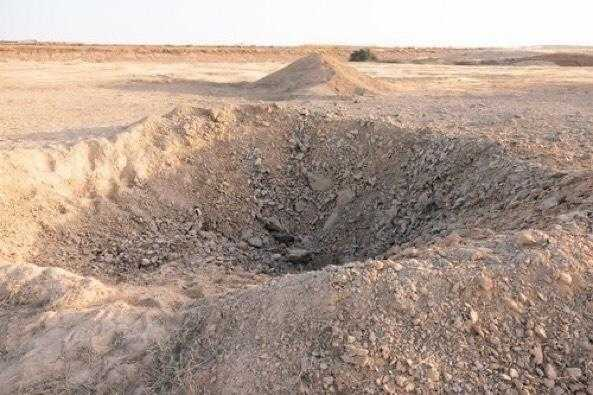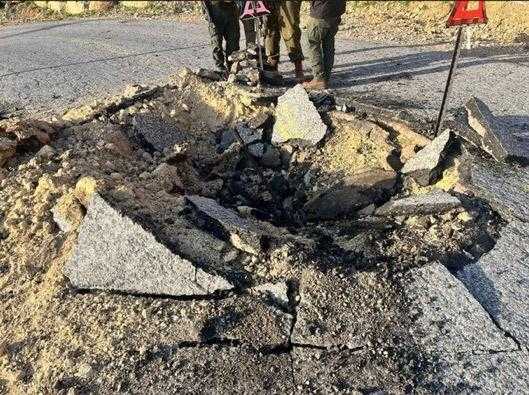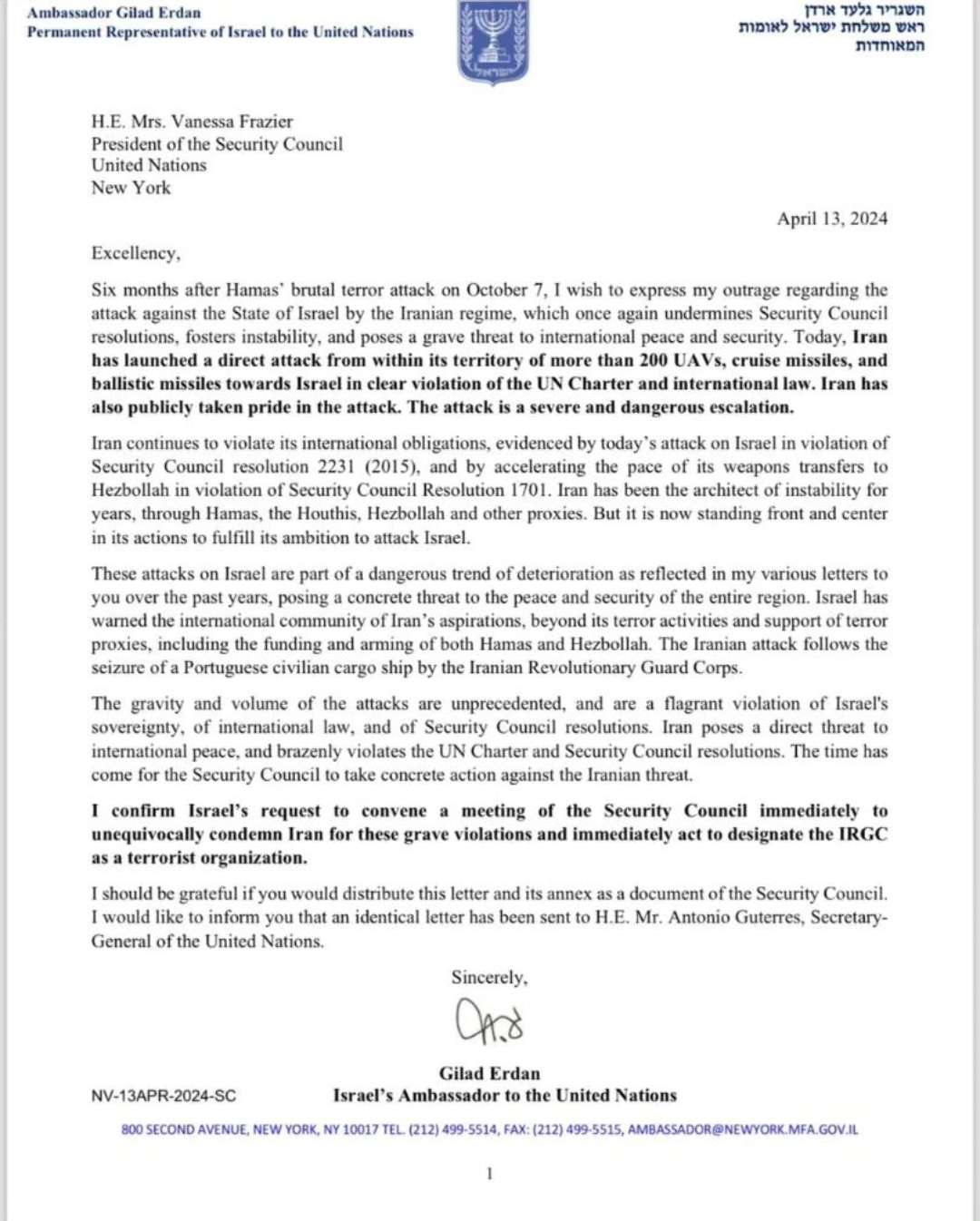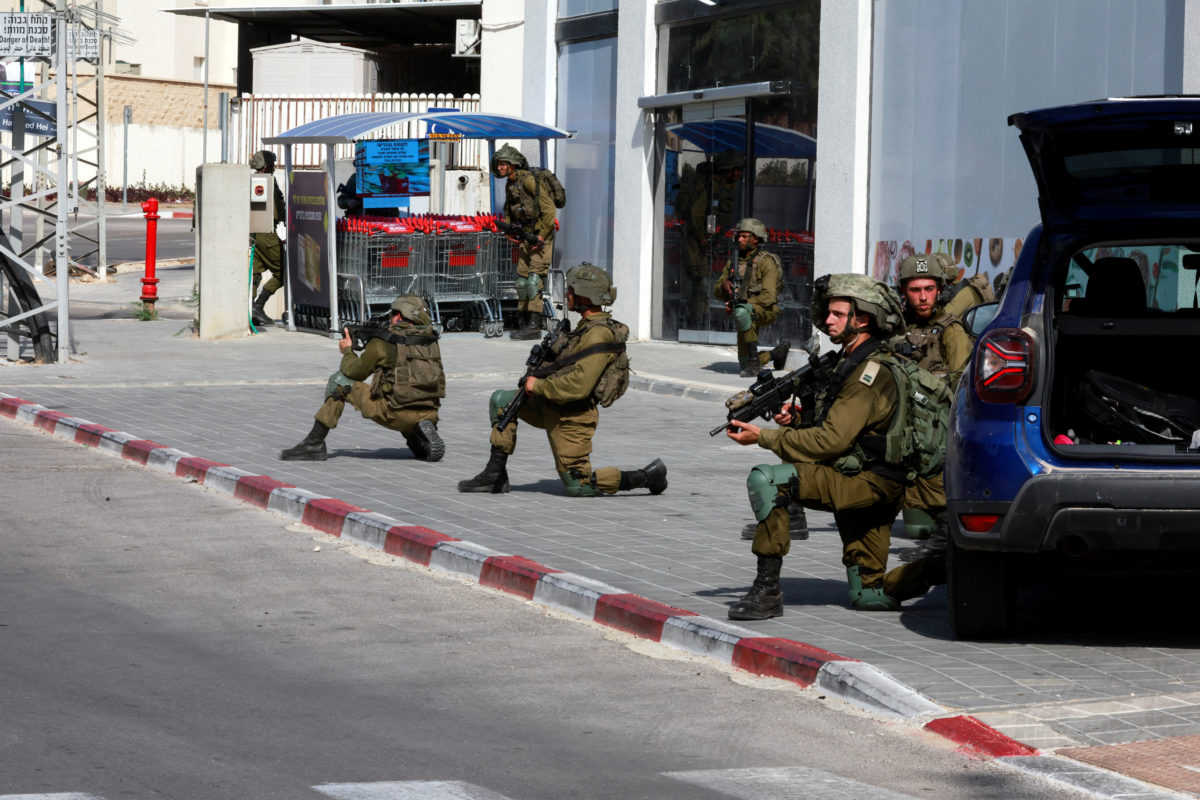In a heavily anticipated showing, Iran has carried out a large-scale missile and drone attack against Israel in retaliation for the killing of several high-ranking IRGC members during an Israeli airstrike against a consular annex located next to the Iranian Embassy in Damascus, Syria, on April 1.
This unprecedented attack marks the most significant escalation since the start of the Israel-Hamas fighting on October 7th. This also marks one of the rare times throughout the fighting in the region where Iran itself has struck Israeli targets directly without the circumvention of using it’s proxy forces.
Iran’s Retaliation:
Just prior to the attack, open-source outlets began reporting major movement on flight radars, including the Israeli executive plane Wing of Zion going airborne and leaving Israeli airspace. Shortly after, Axios’ Barak Ravid broke the initial report on Iranian drones being airborne, marking the start of the attack.
BREAKING: Sky over Jerusalem as Iran attacks Israel pic.twitter.com/g7MyOMxIj1
— Faytuks News ? (@Faytuks) April 13, 2024
The initial attack wave saw at least 170 Shahed 136 explosive drones launched from Iran, Iraq, and Yemen towards Israel, with civilians posting footage online of the low-flying drones and their iconic loud buzzing. Israeli, US, British, Jordanian, and possibly French aircraft engaged, knocking down most of these over Syria and Jordan, with the latter opening its airspace in cooperation with Israel. Israeli officials say that none of the drones were able to enter Israeli airspace.
Secondary and tertiary attack waves seen the launch of about 120 ballistic missiles and at least 30 cruise missiles. The Israel Defense Forces reported that most of the projectiles were intercepted before reaching Israel; however, breakthroughs and falling debris caused damage across the Jerusalem area and Negev region, where videos showed several direct impacts by missiles. Most notably, the area around Nevatim Airbase, which houses a large fleet of F-16 and F-35 aircraft, was hit several times according to onlookers and online videos, with satellite imagery showing an impact on a runway apron. Ramon Airbase was also said to have been hit. However, the IDF claims only minimal damage was taken at either.


There has been no conclusive word yet on casualties or the full extent of the damages, but Israel has confirmed at least one injury from the evening. There are also unverified claims of three deaths due to falling debris in Jordan.
Another potential impact on the runway, and just south of it. Can't make up my mind on the one south of it, could be the change in light which can be observed on the larger structures.
Higher resolution required for this. pic.twitter.com/Th4ABxygXy
— Aurora Intel (@AuroraIntel) April 14, 2024
International Reactions and the United Nations Meeting:
Iran stated following the attack that “the matter can be deemed concluded” in reference to its retaliation. They followed with, “However, should the Israeli regime make another mistake, Iran’s response will be considerably more severe.”
Conducted on the strength of Article 51 of the UN Charter pertaining to legitimate defense, Iran’s military action was in response to the Zionist regime’s aggression against our diplomatic premises in Damascus. The matter can be deemed concluded. However, should the Israeli…
— Permanent Mission of I.R.Iran to UN, NY (@Iran_UN) April 13, 2024
Israel has promised “unprecedented retaliation”, with Israeli media reporting several meetings of the war cabinet to discuss the possible response. The United States and other allied nations have urged restraint, with a senior Biden administration official telling CNN that “the U.S. will not participate in any offensive operations against Iran; U.S. President Joe Biden has made [this] clear to Israeli Prime Minister Benjamin Netanyahu.” Biden also stated that “Israel should consider tonight a win because the current U.S. assessment is that Iran’s attacks had been largely unsuccessful and demonstrated Israel’s superior military capability.” This happened during a phone call between the two leaders that took place at the tail end of Iran’s drone and missile barrages targeted at Israel, which were largely intercepted.
Biden reaffirmed “America’s ironclad commitment to the security of Israel” in a statement after the call and said the U.S. helped take down most of the drones and missiles.
Additionally, Biden is continuously working with G7 leaders to coordinate a diplomatic response to Iran’s attack. The U.S. military moved aircraft and ballistic missile defenses to the region in the past week, according to the White House, in an apparent preemptive anticipation of the attack by Iran and any further escalation.
Secretary of State Antony Blinken, Defense Secretary Lloyd Austin, and national security adviser Jake Sullivan have all reiterated U.S. support for Israel as well.
The United Nations Security Council met on April 14, hearing statements from the involved parties.

The meeting was characterized by many of the nations present calling for an end of hostilities between Israel and Iran alongside other groups active in the ongoing struggle in order to preserve the security and stability of the Middle East and prevent the conflict from spilling over to other nations.
The nations of the United Kingdom, France, the United States, Malta, Switzerland, and several others condemned Iran’s attack on Israel, with Switzerland and Malta further condemning the attack on the Iranian embassy in Damascus by Israeli forces.
The majority of the nation’s present further expressed the need for a ceasefire in the region alongside the release of hostages held by Hamas and the introduction of humanitarian aid in Gaza.
During the meeting, the Israeli delegation drew connections between Iran’s Supreme Leader, Ayatollah Ali Khamenei, to Adolf Hitler, claiming that the Iranian leader wishes to employ a “global Shiite hegemony” with the goal of “world domination by exporting its (Iran’s) radical Shiite revolution across the globe.”
The Iranian delegation claimed that the attack was in line with the UN’s charter on national self defense, claiming that the action was necessary in order to address the Israeli bombing of the Iranian embassy complex in Damascus with the strikes only targeting military targets.
The delegation further claims that the United Kingdoms and France have turned a blind eye to Israeli attacks in Syria before further claiming that the United States has protected Israel from consequences
The Syrian delegation opened by claiming the protection offered to Israel by the United States has led the Middle Eastern nation to believe themselves as above international law and the United Nations.
The Syrians then claimed that the US alongside its allies has prevented measures enacted by the UNSC to hold Israel accountable for the nation’s perceived crimes.
Possibly a Selective Response to Draw Down Tensions:
Many analysts highlight the ineffectiveness of the Iranian attack, as well as the ample reaction time given to US, Israeli, and allied forces to respond, as a possible intentional move from Iran. Such a calculated reaction would be an indication that US back channels with Iran were successful in convincing the Iranians to not escalate further. Iran carefully chose military targets, most of which were able to fend off the missiles and drones. Those that did get through caused only light damage to base infrastructure or landed harmlessly in the dirt.
While this is only speculation, it stands to reason that Iran had to respond to the Israeli attack on their embassy in Damascus as a show of force, but did not seek to escalate the conflict into all out war. To put it clearly, some experts believe the attack last night may have been a symbolic move, carefully crafted for Iran to save face while also deescalating tensions without risking the need for further attacks from either party. This was most likely done with promises from the United States to hold Israel at bay.
What remains to be seen is if this attack really will be the reset for the back and forth balance of attacks in the Middle East, or if Israel will retaliate further, possibly escalating the conflict to a potential breaking point – one in which the world desperately aims to avoid.

